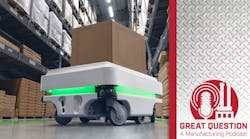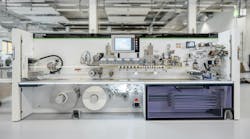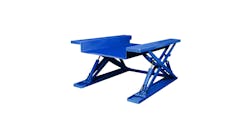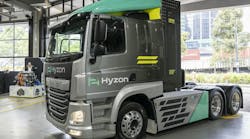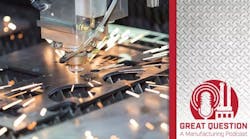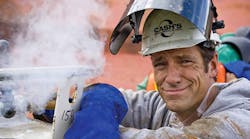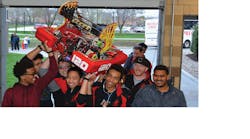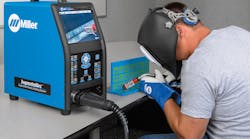Mike Rowe never wants you to lose your sense of total wonder.
About how a flick of the switch on the wall turns on the lights.
About how a turn of the key (or, more often these days, a press of a button) revs your engine and sets you down the road.
About how one finger can flush away so much crap.
Because, you see, when you lose your sense of wonder about the world around you, about all those little things that make life that much easier, that much better, you lose any real connection to it. And you lose any real understanding of it.
"When we lose our sense of wonder," Rowe says, "when we lose our basic appreciation for things, that sets the groundwork for the eventual disconnect that leads to vocational education vanishing from high schools and a widening skills gap. That's contemporaneous with spiking unemployment and all these seemingly dichotomous things that leave people scratching their heads."
Rowe would know better than most, of course. He hosted eight seasons of Dirty Jobs on the Discovery Channel and another three seasons of Somebody's Gotta Do It on CNN. Those experiences dropped the onetime opera singer and longtime pitchman into mines and factories and the kinds of places most folks are told they should avoid. They also helped propel him to the forefront of lobbying for tradesmen and laborers, and for shaking off the stink most people think of when they think about hard work.
On this sixth annual Manufacturing Day, as we trumpet the best of industry, he might just be the patron saint hard work always seems to need.
♦ ♦ ♦ ♦ ♦ ♦ ♦ ♦ ♦
"The portrayals of work have not kept up with the reality of the jobs," Rowe says from New Orleans, in between what he calls "the normal stuff" of shoots and meetings and "a hot mess" of new stuff. "I think it's broader. I think this business of blue collar versus white collar, or clean versus dirty, it's a false choice."
In 2017, after all, thanks to technology opening just about every last bit of information and knowledge to the masses, you can be a philosopher and a welder.
"This idea that you have to be one or the other, that's craven, and that's hurting manufacturing and the skilled trades," Rowe says. "It's really hurting the current crop of Millennials, who are still being raised to believe that this is the path and the other paths are mutually exclusive. The biggest thing we can do to create a more well-rounded generation is to get the vocational arts — and they used to call them that, it wasn't always shop — back into elementary, middle and high school.
"You gotta start somewhere. That's where I'd start, if you really want to close the skills gap and reinvigorate manufacturing."
Rowe has ideas. After so many years on the road and so many conversations with workers and bosses and politicians, he has ideas that might actually take a swing at the skills gap. Most of those ideas involve private businesses. Keep government out of it, he reasons, and folks might agree with it more.
"I think part of the solution is rooted in big business taking the message straight into the communities," Rowe says. "Get businesses involved that have skin in the game, that have a vested interest in seeing the skills gap close and in training the next generation of workers.
"If I were king of the world, I'd be looking to Home Depot and Lowe's, and I'd get a bunch of 18-wheelers and fit them as mobile shops. I'd send them out every weekend with half a dozen retired craftsmen." C'mon out, everybody. Kids, parents, folks who want to learn a trade, folks who just want to make stuff. Spend some time working with your hands.
According to one survey conducted earlier this year by the National Federation of Independent Businesses, 45% of small businesses reported they were unable to find qualified applicant to fill job openings. Not many people work with their hands much anymore, except to steer their car and pound out texts on their phones.
Another idea rolling around in Rowe's head is to bring public relations into all of this. Manufacturing Day is great, but even after half a decade, how many people really know about it? How many people know about competitions geared for students, like the FIRST Tech Challenge? If a Maker space opened right around the corner, how would anybody ever find out?
"It sounds absurd to champion PR, but we can't underestimate the power of making work cool again. If you meaningful deride and discourage whole categories of jobs, for a kid who's 13, 18, 20 years old, that's powerful. That never leaves them. Something like 68% of Millennials would not take a construction job. They would rather be unemployed than make a hundred grand a year working in construction."
Think about that for a second. This aversion to hard work — to the stigma of jobs we were told we should never do — is so great we'd rather sit on the couch than sock away more cash in one year than the average American worker makes in two.
"We've got it in our heads there's a whole category of jobs that are beneath us," Rowe says. "If that perception doesn't change, that's where we're gonna stay. If the next generation doesn't affirmatively look at work and see opportunity, we're screwed."
♦ ♦ ♦ ♦ ♦ ♦ ♦ ♦ ♦
Is there some hope, though? Are we at least sort of headed in the right direction? Are jobs and manufacturing — and the whole country, for that matter — better off now than a year or two or 10 ago?
Rowe doesn't wait for the end of the question. "No," he says.
"No, but look. I would say there are two ways to be headed in the wrong direction. The first is to be lost and not know you're lost. The second is to at least know you're going in the right direction. The key to going in the right direction is first sort of realizing that you're lost. I think we've realized that.
"I think we've realized that we're lending money we don't have to kids who can't pay it back to educate them for jobs that don't exist anymore. I think there's a growing awareness in the country that $1.3 trillion in student loans is actually on us. We hold the note. When the economy tanked in 2008, there were 2.3 million available jobs. Today, there are 5.6 million. I can't say we're going in the right direction, but I think we're getting some semblance of critical mass, in terms of this growing unease that surely has to precede any meaningful change of course. But we're not as lost as we were."
Every year, Rowe hands out hundreds of thousands of dollars through his mikeroweWORKS Foundation, a 501(c)(3) that rewards people who want training for real, skilled jobs. He makes applicants jump through some hoops. They have to write an essay. They have to shoot a video. They have to submit references. They have to make a case for themselves. "The kind of things you might actually have to do in the real world," Rowe says.
Rowe has never struggled to give away the money. The applicants have always been strong. The hunger to learn and to work has always been there.
We're not as lost as we were. That's sort of beautiful, right? Remember that.
And remember to never lose your sense of total wonder.
This story was originally published on IndustryWeek's Manufacturing Day special site.
